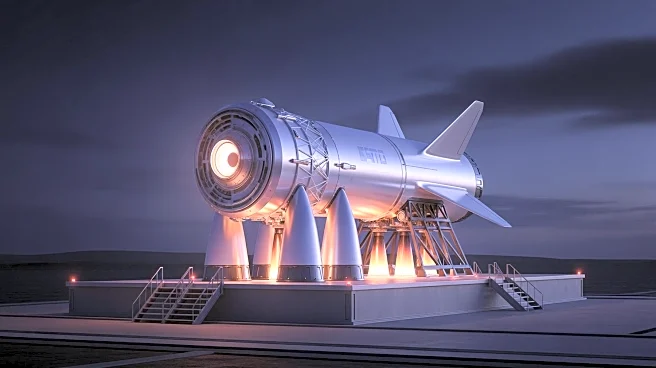What's Happening?
HyImpulse, a German launch startup, has secured €45 million ($52.5 million) in funding to accelerate the commercialization of its orbital rocket, SL1. The funding is split between private investors and
public funds, with €15 million from private sources and €30 million from public financing. HyImpulse aims to develop a reliable European launcher, addressing the continent's lack of independent access to space. The company is working on a three-stage small launcher using hybrid propulsion, marketed as a 'flexible taxi service' to space. HyImpulse plans to conduct its first commercial flight with the SR75 suborbital rocket next year, with the SL1's first flight targeted for 2027.
Why It's Important?
HyImpulse's funding and development efforts are crucial for Europe's space industry, which currently lacks independent access to space. By advancing its orbital rocket capabilities, HyImpulse could enhance Europe's competitiveness in the global space market, potentially reducing reliance on non-European launch services. This development is significant for the U.S. as it highlights the growing competition in the space launch sector, which could impact American launch providers. The investment in hybrid propulsion technology also reflects a broader trend towards innovative and sustainable space solutions, which could influence future U.S. space policy and industry practices.
What's Next?
HyImpulse's progress may encourage other European companies to invest in space launch technologies, potentially leading to a more competitive and independent European space industry. The company's upcoming commercial flights could set new benchmarks for small launchers, influencing global standards and practices. U.S. stakeholders may need to monitor these developments closely, as increased European capabilities could affect international collaborations and market dynamics. The success of HyImpulse's orbital rocket could also prompt further investments in hybrid propulsion technology, driving innovation in the space sector.
Beyond the Headlines
The push for European independence in space access could have geopolitical implications, affecting international space collaborations and alliances. As Europe develops its own launch capabilities, there may be shifts in global space policy and cooperation. Additionally, the focus on hybrid propulsion technology highlights the industry's move towards more sustainable and efficient solutions, which could lead to long-term environmental benefits and ethical considerations in space exploration.










